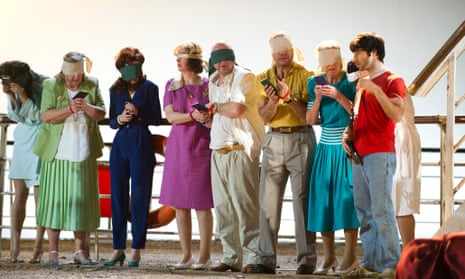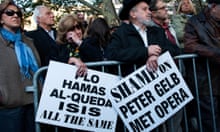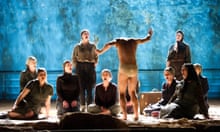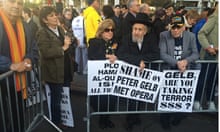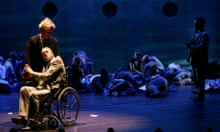This is genuinely jaw-dropping from the Metropolitan Opera. According to their own statement:
“After an outpouring of concern that its plans to transmit John Adams’s opera The Death of Klinghoffer might be used to fan global antisemitism, the Metropolitan Opera announced the decision today to cancel its Live in HD transmission, scheduled for November 15, 2014."
Peter Gelb, the Met’s General Manager, says the following:
“I’m convinced that the opera is not antisemitic. But I’ve also become convinced that there is genuine concern in the international Jewish community that the live transmission of The Death of Klinghoffer would be inappropriate at this time of rising antisemitism, particularly in Europe."
The problem for Gelb is that the two statements that he’s “convinced” about are totally contradictory. If you think the piece is not antisemitic (and I, along with the vast majority who have seen the Met’s production – directed by Tom Morris, it was first seen at English National Opera in 2012 – agree with him) then you cannot also hold the position that the opera would exacerbate “rising antisemitism, particularly in Europe”. At the very least, it follows from Gelb’s first statement that he cannot personally agree with the “concern in the international Jewish community” about the opera’s propensity to “fan global antisemitism”.
There’s no need to rehearse the arguments about the opera’s treatment of the passengers and terrorists on board the Achille Lauro in 1985: how the piece clearly voices the grief of Klinghoffer and his wife, and equally clearly, how it exposes the disastrously twisted world-view of the terrorists, while also acknowledging and voicing, in powerfully moving choruses, the feelings of communities on both sides of the Israeli-Palestinian conflict. (Read Robert Fink’s brilliant article on the issues of Klinghoffer’s composition, reception, and musical treatment of the drama, and its consequences for the representation of “American Jewish self-identity” here. ) In fact, whatever your views on the piece, whether you think the real controversy in it is to do with its hybrid of opera and oratorio – whether it works as an opera, in other words – or whether you think it should be censured, the Met’s position is a mess.
Perhaps there are other reasons why they feel that have no other option, as the statement says, “after a series of discussions between Mr Gelb and Abraham Foxman, national director of the Anti-Defamation League, representing the wishes of the Klinghoffer daughters”. But the opera is still being staged in the Met - as it should be - yet audiences around the world will be denied the chance to see it and to make their own mind up about its dramaturgy and its music. Not only does that not make any logical sense, it risks reducing this opera – however you think of it, one of the most important of the late 20th century – to yet another controversy, yet another censorship row, and fails to engage with the substance of the work, which is more nuanced and thought-provoking than any of the caricatures of its music and drama.
As Robert Fink puts it, Klinghoffer “does not romanticise terror. It tries for something much more difficult, so difficult that its failure has been splattered for decades over the pages of the American press. The Death of Klinghoffer attempts to counterpoise to terror’s deadly glamour the life-affirming virtues of the ordinary, of the decent man, of small things” – embodied in the opera by the character, words and music of Leon Klinghoffer. That’s not an idea that should be censured, it’s one that should be broadcast to, and experienced by, as big an audience as possible.
